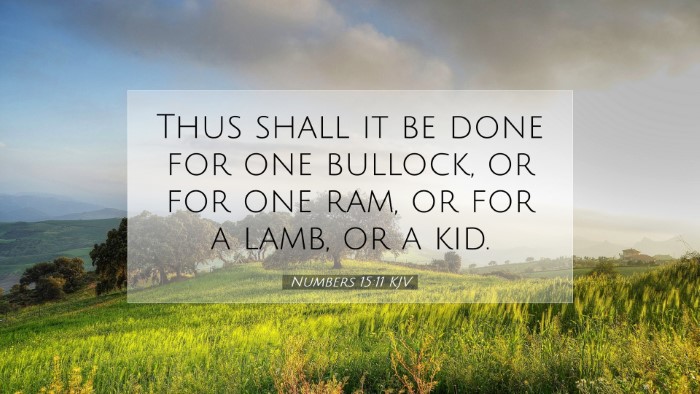Commentary on Numbers 15:11
Verse Context: Numbers 15:11 states, "Thus shall it be done for one bullock, or for one ram, or for a lamb, or a kid of the goats." This directive comes within the broader context of the sacrificial system articulated in the Book of Numbers, where God provides specific instructions on offerings to be made.
Contextual Analysis
This verse highlights the importance of ceremonial laws given to the Israelites. These laws demonstrate God's holiness and the need for atonement for sins. Understanding the sacrificial system is crucial for grasping theological themes of sacrifice, atonement, and worship in the Hebrew Scriptures, which ultimately point forward to the ultimate sacrifice in Christ.
Commentary Insights
Matthew Henry's Commentary
Matthew Henry emphasizes the significance of obedience to God’s commandments. He states that the varied nature of offerings (bullock, ram, lamb, or goat) represents the diversity of worship and the need for every individual to approach God in their own way, yet conforming to His prescribed methods. His commentary reflects on the inclusivity of the sacrificial system, accommodating different social standings within the Israelite community.
Albert Barnes' Notes
Albert Barnes elaborates on the ritualistic framework of these sacrifices, pointing out how they were integral to Israel's covenant relationships with God. He notes that this verse not only specifies the types of animals to be used but also that sacrifice is an acknowledgment of sin and a means of seeking divine favor. Furthermore, Barnes highlights that the consistency in offering reflects the unchanging nature of God’s requirements for holiness and worship.
Adam Clarke's Commentary
Adam Clarke provides a deep theological reflection on this verse. He discusses the symbolism of each type of animal and its significance in representing different aspects of the atonement. Clarke argues that the offerings remind the Israelites of their covenant obligations and point towards the future fulfillment of these requirements through Christ’s sacrifice. He emphasizes that the act of sacrifice is a powerful demonstration of repentance and commitment to God's commandments.
Theological Implications
Theological reflections on Numbers 15:11 reveal key insights into the nature of sacrifice and atonement:
- God's Holiness: The sacrificial system underscores the holiness of God and the separation between Him and sinful humanity.
- Atonement: Each offering serves as a means for atonement, illustrating that sin incurs a debt that must be reconciled.
- Types of Offerings: Different offerings indicate the various ways individuals and families could engage in worship, showing that everyone has a role in community worship.
- Preparation for Christ: The repeated theme of sacrifice prefigures the ultimate sacrifice of Christ, drawing connections to New Testament theology.
Practical Applications
For pastors, students, theologians, and Bible scholars, Numbers 15:11 provides a springboard for various applications:
- Worship and Obedience: Reflect on how contemporary worship practices both honor and reflect obedience to God’s commands.
- Community and Diversity: Engage with the community aspect of worship, understanding that individuals contribute uniquely to the church body while maintaining unity in Christ.
- Understanding Sacrifice: Teach the importance of self-sacrifice and the willingness to give of oneself for the sake of others, echoing Christ's example.
- Preparation for Worship: Encourage a mindset of reverence and preparation as believers approach God in worship, reminiscent of the seriousness with which the Israelites regarded their sacrifices.
Conclusion
Numbers 15:11 encapsulates key themes of sacrifice, worship, and obedience that resonate through Scripture. The insights drawn from historical commentaries provide rich layers of understanding that inform both theological study and practical application in contemporary Christian living. As we explore these truths, may our understanding of worship deepen, and may we be ever mindful of the cost of our redemption through Christ.


